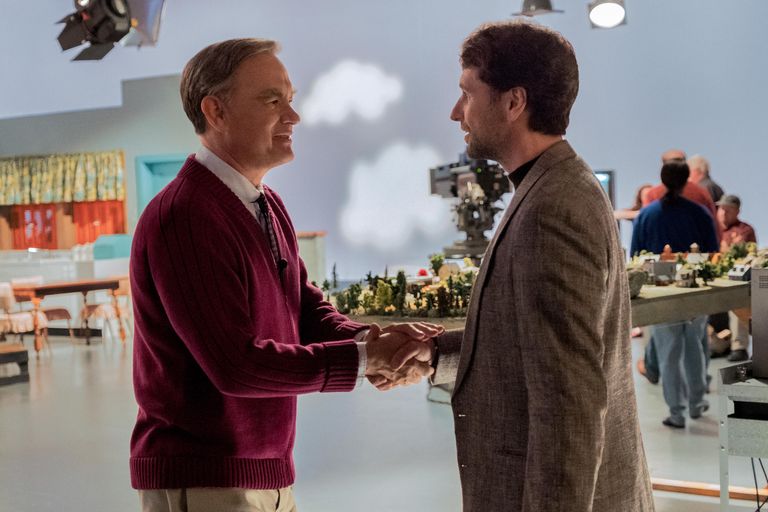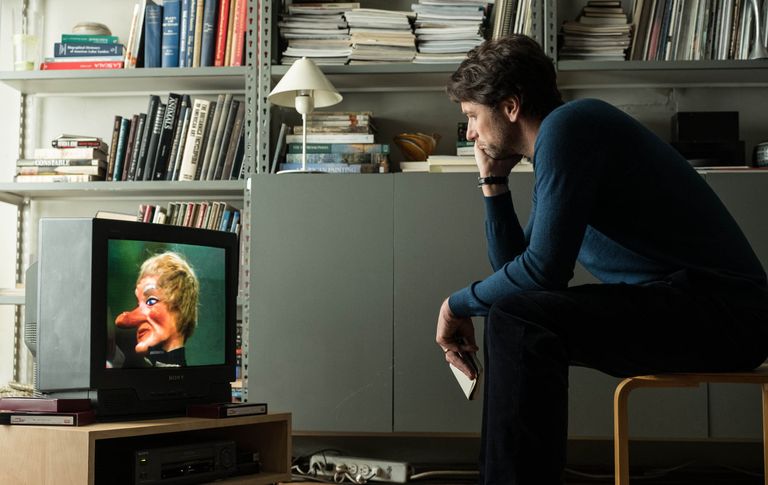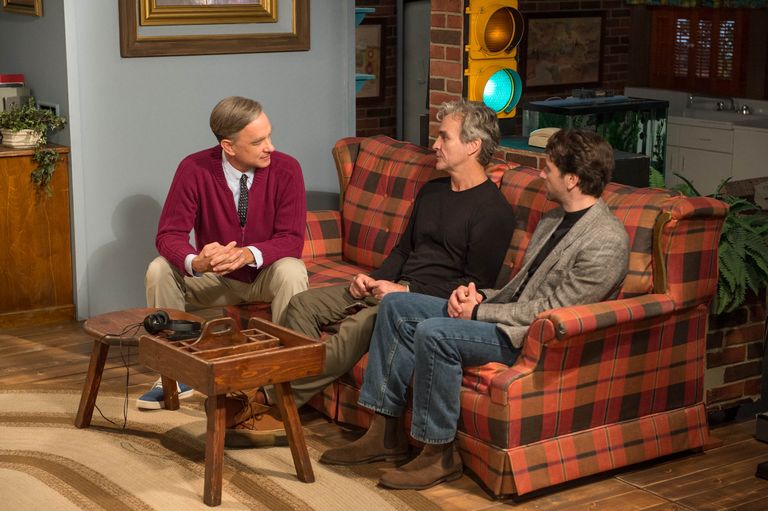|
here’s a moment in “Can You Say… Hero?”—Tom Junod’s Esquire profile on Fred Rogers, one of the all-time great magazine stories—when the writer is searching for the children’s TV icon at the stuffed, panic-attack-palace of Penn Station. Mister Rogers spots him first, naturally, amidst the swarm of New Yorkers, about the five-hundredth happy coincidence in a life full of them. At first, I chalked this up to some Neighborhood of Make-Believe voodoo energy, but now I have a legit answer. Last week, Junod was in New York to walk in a charity fashion show for his alma mater, SUNY Albany, so I tried to get a hold of him for an interview about his Esquire story and A Beautiful Day in the Neighborhood. The day of the show, he called and asked if I could take the subway down to Bryant Park. I said sure, hung up, and realized I didn’t exactly catch where in Bryant Park—another New York capital of constant, nightmarish pedestrian overflow. Read Tom Junod's Iconic Mr. Rogers Profile Can You Say...Hero?Twenty minutes later, I got off the train, chose the closest of the station’s 14 exits to start my Junod scavenger hunt from, reached the top of the stairs, turned to cross the street, and, wow, okay—over on the other end, red turtleneck, black suit, there he is. Really, I think it’s just that Tom Junod is a guy who stands out in a crowd. We swung up to the fashion show venue, where I watched Junod practice his strut to untz-untz-untz beats and avoid a janky step at the start of the runway. After I watched the walkthrough—and was somehow briefly enlisted in fashion-show-planning service as the only idle body in sight—we sat down on a couch in the middle of all the swirling fashion-show-planners, and talked about Fred Rogers, what he left behind, and what we do now. ESQUIRE: In your Atlantic piece, you talk about how there’s no true successor to Mister Rogers. But do you think there will be one? ADVERTISEMENT - CONTINUE READING BELOWTJ: I don’t know. I’ve had people take issue with that. I’ve had people say, ‘I know a lot of people who are really kind, but they’re just not media people, so no one knows about their kindness.’ I mean, the point is that Fred was a media person, and he did have a platform, and he spoke to an extremely large audience that he made into an even larger audience. It wasn’t like Fred was just a kind man who worked at the local food bank. He was a kind man who made it a point to practice kindness to a vast audience, person by person. There are many people who follow the legacy of kindness, but I don’t know of anybody who follows his legacy of kindness in media. Except for people who are on the new-age end of it. And I think that audience is sort of self-selecting and limited by definition, almost. ESQ: I mean, you said that if he grew up in the age of Twitter, you can expect what he would have done. But, in that same way, do you think he could have became what he did with social media instead of TV? TJ: I mean, I don’t know. I do think that if you transported Fred through time from then ‘til now, would he try? Yeah, he would. I mean, Fred wasn’t just a reformer when it comes in terms of message. He was a reformer in terms of method. He was not a dogmatic person, but he was dogmatic about that—that media should not be used as a distraction. A distraction itself was dangerous. ESQ: You wrote in the original piece that he didn’t even watch TV. TJ: I don’t think he watched a lot of TV, but I think he was also against quick cuts. I mean, he was in favor of that—media should be human. Meaning that there should be mistakes, there should be accidents, and if that was filmed, then it should stay filmed. ESQ: Which comes across in the movie. TJ: Yeah, have you seen the movie? ESQ: I saw it on Monday, yeah. TJ: Okay, so there’s that scene in the beginning of the movie where he’s zipping up his sweater. He’s obviously having trouble zipping up his sweater, it’s not easy for him, and I know that it took like many, many takes to do that. And I don’t know which take they use, but it was hard for Tom to do that. ESQ: And the tent scene [where Mister Rogers struggles to put together a camping tent for a Mister Rogers' Neighborhood segment], was kind of-- TJ: I mean, the tent’s great, but the tent’s intentional. But it’s the unintentional stuff that I think is really true to life. And it’s all in there. You know that they shot it with like the original cameras. ESQ: I didn’t know that. TJ: Yeah, yeah. ESQ: I wanted to ask you about that nightmare scene [where Lloyd Vogel, the character loosely based on Junod, dreams that he's a character in the Neighborhood of Make-Believe]. TJ: I mean, I never had that nightmare, but very interesting. And, it’s definitely one of the reasons that changing the name to Lloyd Vogel worked, because I think that things sort of drift towards magical realism at that time. I mean, if that was Tom Junod with bunny ears, I don’t know how I would have responded. I was okay with Lloyd Vogel with bunny ears. 'The fact that I’m talking to you at a fashion show with a turtleneck on, you know, the irony is not lost on me.' ESQ: One thing I was really interested in how in the The Atlantic piece, you spell out masculinity as defined by your father. TJ: Yeah, yeah. ESQ: And then by Mister Rogers. Do you see masculinity as different ends—like you could be this person or this person? Or do you take elements of what you see of the best men in your life, and try and put it together into one person? TJ: I think you try to put it together in one person. But I mean, Fred and my dad could not have been more different. They’re polar opposites. Fred’s favorite saying from all of literature was, “That which is essential is invisible to the eye,” from The Little Prince. For my father, everything that was important was visible to the eye. Appearance, presentation, looks. And the fact that I’m talking to you at a fashion show with a turtleneck on, you know, the irony is not lost on me. ESQ: Another interesting thing in your piece is how you talk about how there’s still a hunger for spreading goodness in the world. But at the same time, we don’t know what to do with the lessons that Mister Rogers gave us. In your eyes, what’s the reason for the lack of action? TJ: That’s a great question. I’m not gonna be describing anything but my social media experience, but I think that the social media experience—and I don’t want to blame everything on social media, either—but I do think that social media tricks you into thinking that being unkind can be in itself, moral. That bad people don’t deserve kindness, and that you, when you you literally call them a piece of shit on Twitter, that you are somehow striking a moral blow, that you are somehow being part of the resistance. And I just think that it’s a trap; I think it’s false. Fred was all person by person. And in a lot of ways, things that couldn’t happen on a person by person level could happen on media, because it’s mob versus invisible person. I bring up the Pam Bondi thing in the The Atlantic piece—where they actually use Fred to hound somebody. And that always struck me as perverse. ESQ: It’s sick ammunition. TJ: Yeah, yeah. And I called Joanne [Rogers] after that and said, “What do you think about that?” And she was like, “You know, Fred would never represent that.” That seems so obvious, but I think to a lot of people it’s not obvious because I think that the temptation of being able to think that yelling at somebody on the street, you’re somehow striking a blow. That temptation is really large because it’s so easy. ESQ: So it’s like we don’t know—with the popular mediums we have now—how to show kindness or come up to each other. TJ: I think the mediums themselves sort of make us prejudiced against that. Lacey TerrellESQ: In both pieces, the original and The Atlantic piece, prayer comes up. I grew up Roman Catholic. TJ: I grew up Roman Catholic too. Twelve years in a Catholic school. ESQ: So my relationship with prayer has ebbed and flowed my entire life. TJ: Same here. No question, same here. ESQ: Now it’s landed at a point where I pray for my family, pray for anyone who needs it. I’m just wondering on your end, where has your relationship with prayer landed now, and do you think it will continue to change? TJ: Well, I think it’s always changed, just like yours that way. But when I did my first draft for the The Atlantic, I wrote that I still don’t know what Fred wants from me, or wants from us. And then my editor, Denise Wills said, ‘Could you try to think of an answer to that question?’ And I thought about it, then I had to read the story again for the audiobook of this collection of Fred’s writings and sayings. And my essay from 1998 is the intro for that. It was the first time I had read the story in a really long time. And when I read that, I realized that what I was looking for was really unavoidable and obvious. He was leading me to that moment of prayer that whole time that I was with him. And what did Fred want from me? He clearly wanted me to pray. He clearly believed in prayer as a way of life. He prayed every day of his life. He woke up in the morning and prayed, and wrote, and prayed for people. And so I wrote that. The answer to: What did Fred want? He wanted us to pray. I have actually tried, since that moment, I’ve tried to pray. I mean, I find prayer somewhat problematic. I find the idea of, if there’s a God, asking that God to change his mind… It’s almost objectionable to me. I don’t like it. ESQ: That’s where I’m at right now. It’s like if you don’t do it, maybe it won’t happen. TJ: You can get into all sorts of weird head-trips about prayer and its purpose. I just try to ask for some sort of affirmation, you know? I’ve gone on the road through this story and I’ve become a spokesman not just for the movie, but for Fred, and it’s one of the great surprises of my life. If somebody had said five years ago, that I was going to be spending the months in October and November 2019 sort of speaking for Fred Rogers—yeah, right. And yet, here I am. And so what I try to pray really is that I represent his message accurately and wholeheartedly. That’s what I actually pray for. That’s as far as I want to go, you know? Does it mean anything? I’m not sure about it. But it might mean something to me, so that’s why I’ve been doing it. ESQ: Have the past two months been fulfilling for you? TJ: Yeah, they have been. I mean, to be honest with you, I’ve been going and going in front of a crowd [suddenly, a lightbulb in Junod’s eyeview explodes in flames] Woah! There’s fire up there guys! That light just burned out and there was… I mean, that was on fire. [Junod gets up, alerts others to the now-smoking lightbulb, and returns with potato chips to share.] ESQ: Did that just straight-up flame? TJ: Yes. I would love to remove that but I don’t know. Yeah. That was on fire, right? But in answer to your question, I mean there are all sorts of ways to be helpful and be of service. I don’t know if I’m ever going to be as good at the active devotion whereas Fred would like me or us to be. But there’s a lot of different ways to do it. And for me going out and talking about it has been a great experience for me. And a lot of times conversations go to places that I don’t expect them to go. And I’ve tried to do it so that I’m not just repeating the same line, trying to kind of live in the moment. So far, it’s worked pretty well. I mean, one of the great surprises of my life is doing this. Shared from https://www.esquire.com/
0 Comments
Leave a Reply. |








 RSS Feed
RSS Feed